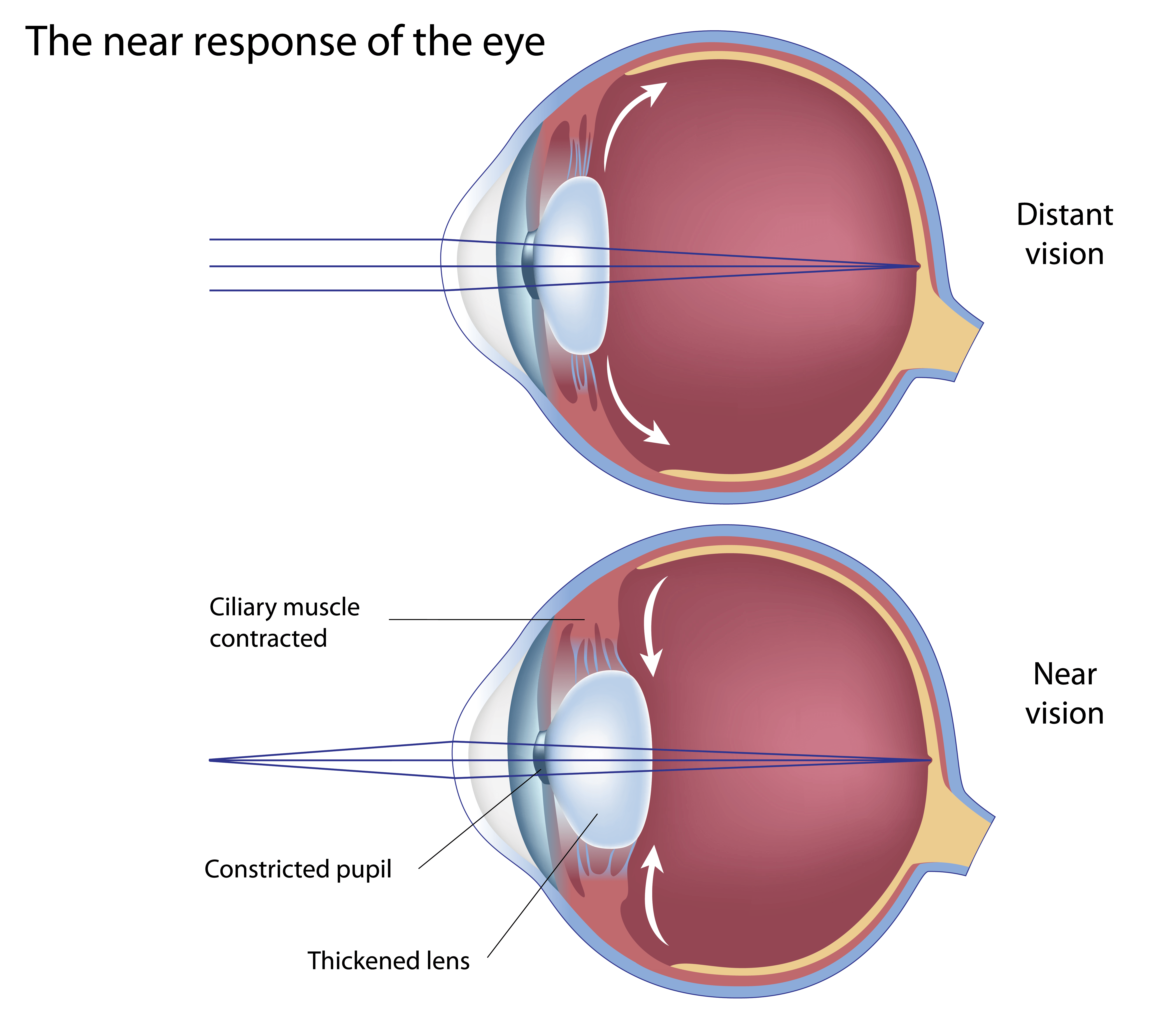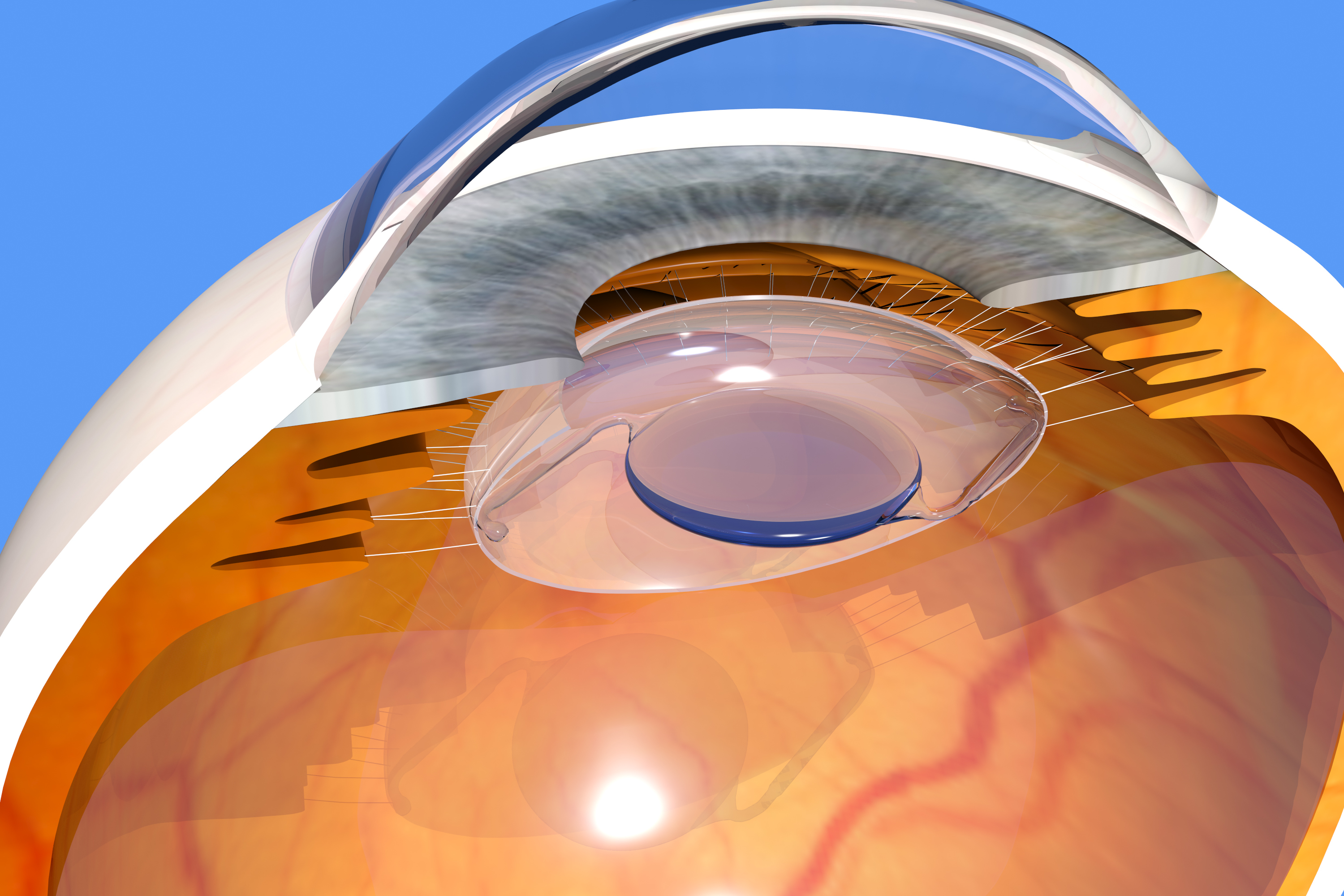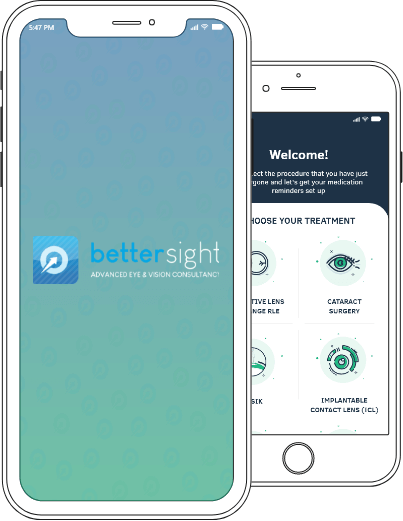

Surgically identical to cataract surgery, RLE offers you the chance of freedom from spectacles AND eliminates the risk of future cataract formation. If there was ever a vision correction procedure 'for life' this is it.
or you can download my guide to State of the art vision correction treatments


The human natural lens is a truly remarkable little thing. In our youth the natural lens could be imagined to be like a droplet of water inside a transparent capsule. This gives the natural lens two very important properties: Transparency and Flexibility.
Transparency is obviously good for allowing light to enter the eye and get to the retina which processes the light and allows us to ‘see’.Flexibility is important because the natural lens is able to change shape on command to allow us to see things up close - for example to read a text on a phone or to read a paper. This is called ‘ACCOMODATION’.
Sadly as we age the natural lens slowly starts losing both transparency AND flexibility. This means our vision becomes progressively less sharp AND we start having problems seeing up close from about our mid 40’s onwards. This is called ‘PRESBYOPIA’
In our experience, It is often around this time that many people really start having ‘issues’ with their glasses, this is because:
At Bettersight, our lead surgeon and Medical Director Mr. Rehman has amassed a vast amount of experience in helping many thousands of people get past these problems and leave their glasses behind.
We are used to dealing with complex problems as well as more standard situations. Mr Rehman will personally assess all aspects of your eye health as well as problems you have with your vision. If you meet his stringent criteria for considering Refractive Lens Exchange he will draw on his wealth of knowledge and experience in helping you to decide upon the precise details of the procedure so that we maximise the prospects of total success.
Choosing the ‘right’ Intraocular lens implant is a crucial part of this decision. Mr. Rehman has experience in the vast majority of specialist lens implants available in the UK and always keeps ahead of developments. In fact Mr Rehman is regularly consulted by lens implant manufacturers to assess future lens implant designs.
If you happen to have astigmatism he will again consider what can be done to correct for that too. This is of course a little more complex and may sometimes require custom made lens implants – this is fairly routine for our practice and nothing to be worried about.
If there’s one thing that always marks out a true expert its the results!
So allow us to share with you a brief snapshot of some of OUR results…

Ever since 1949 when London eye surgeon Mr Harold Ridley implanted the worlds first intraocular lens, lens technology has developed at an incredible pace.
The original intraocular lens (IOL) was essentially made from a material similar to perspex and was implanted through a large incision. Fast forward 70 years and today we have IOL's made from high optical quality, flexible materials which can be implanted through tiny 2mm incisions. This means your eye heals and seals much faster.
But there is even more - IOL's also now come with differing optical properties. If you want of find out more about current IOL technology just click here and let's go.
RLE as a vison correction procedure is best considered for people who are in their 50’s or beyond. We generally do not recommend RLE for people under the age of 40, between the ages of 40 -55 there is something of a grey zone (no pun intended!). As we age the natural lens loses more and more of its flexibility making close vision more and more difficult plus, the further you are from your mid 40’s, the higher the prospect of requiring cataract treatment in the upcoming 10-15 years ahead. Because RLE involves removal of the natural lens – Cataract CANNOT happen to someone who has had RLE. This means RLE is regarded as the only vision correction procedure which provides a lifelong effect.
NO. Most patients report the following:
Very few people report any significant discomfort during RLE surgery. Techniques are now highly evolved and the IOL can be inserted through a tiny incision so no stitches are required either! We do suggest a small dose of Diazepam to make the process feel a little less nerve-wracking for you –but this is not mandatory – many people do not feel the need for sedative and that’s also fine.
Yes. Mainly because RLE is likely to provide a long-term solution to your vision correction requirements, many people in their late forties or early fifties can be well suited for laser vision correction but might prefer a procedure that has a long term effect and eliminates future cataract development entirely.
Yes. Because the conditions that lead to changing eye prescriptions are generally stable in middle age and beyond, the result of RLE surgery is also very stable. The major force that changes eye prescriptions in middle age and beyond is the natural lens – this of course is no longer present and is instead replaced with a fixed power intraocular lens – hence the excellent long- term stability that arises.
No. In my practice, over 99% of patients are treated with nothing more than eye-drop anaesthetic – no needles and no injections either! However, for patients who have profound anxiety or medical conditions such as Parkinson’s tremor which may not allow them to cooperate with the procedure we can certainly consider this option. Please note that our GA service is available only at the Spire Hospital Elland.
No. In my practice, over 99% of patients can be treated successfully and with little or no discomfort with nothing more than eye-drop anaesthetic. I do not find it necessary to use needle injections in any case with modern techniques. In fact one might wonder why some many eye surgeons continue to use injections for RLE surgery! something I abandoned over 15 years ago!
Another ‘old wives’ tale from the past – but one that bizarrely continues to linger. NO. ABSOLUTELY NOT – and what’s more it NEVER WAS THE CASE. Your eye remains exactly as it is – rest assured.
You don’t! - A device is used to keep your eye open during the procedure. This means that you can relax and allow the device to safely and comfortably keep your eye open. The other eye can continue blinking normally or if you prefer we can keep the fellow eye shut with a sterile tape.
Don’t worry – some eye movement is normal during the procedure, you don’t need to keep your eye absolutely still, but you will have a light source to look towards which helps you to exert some control on. Experienced surgeons can handle eye movements during surgery so it’s nothing to worry about.
No. The NHS – especially post COVID-19 has a major struggle on its hands simply to restore its major services such as elective surgeries, cancer care etc. The NHS has never offered pure vision correction procedures on a routine basis and is extremely unlikely to ever offer such services. We are not aware of any publicly funded healthcare system anywhere in the world which routinely provides elective vision correction surgery services.
Yes. We have a very specialised protocol in place at all our sites which allows us to perform same day bilateral surgery in the safest way possible. Here is how we do it,
These measures are not easily performed and only a few select service providers are able to meet my stringent criteria to allow safe delivery of same day RLE surgery. You can be assured that I and my team leave no stone unturned to provide the safest possible environment for you to have both eyes treated on the same day in this way – if you choose to do so.
In a word – Very! – Even with very high prescriptions it is possible to achieve excellent vision correction with RLE treatments. The individual intraocular lens may even be custom made for your eye measurements (which is why there can sometimes be a 2-4 weeks waiting time!). However as with any procedure it is possible that some residual small prescription may remain after RLE – where conditions are appropriate and where it is indicated we will offer Laser vision enhancement to provide the final ‘tweak’ to help maximise the chances of achieving excellent un-aided vision. Please note that unless specifically indicated your Laser vision enhancement is complimentary in my service.
EXTREMELY UNLIKLEY. We are not aware of any reports of serious complications arising from RLE surgery that has led to total vision loss in both eyes at the same time. Whilst we can never eliminate risks (in the same way you cannot eliminate the risk of air travel, driving a car or riding a bike) – we work very hard to control and contain these risks to minimise the chances of serious complications arising.
Yes. But it’s very important for you to inform us of your treatment. It’s also helpful to know the following information (if you can get hold of it!)
We have enormous experience of treating people who have had laser vision correction and the outlook for successful treatments is excellent.
Yes. We have special expertise in helping to treat people even with very high amounts of astigmatism or very high optical prescriptions in general. A custom made TORIC intraocular lens is often required and treatment can provide an excellent result – all with the potential back up of having a ‘tweak’ refinement with post-operative Laser vision enhancement – all built into your package of care.
Yes. We have extensive experience of providing RLE to patients who have diabetes as a background condition. If however you have serious eye complications from your diabetes such as macular oedema and or proliferative diabetic retinopathy, then the risk benefit calculus may not be in your favour and we may well advise against any elective eye surgery in such situations.
No – most people are discharged from on-going eye examinations with us at the 2-3 month post op stage. You will however have access to our services for 12 months as part of our complimentary care package. We do advise that you continue to see your community optometrist for general eye checks once every 1-2 years as advised by your optometrist.
This is a condition where some residual ‘lens epithelial’ cells migrate onto the capsule and proliferate in the space between the back surface of the lens implant and the capsule. The capsule is living tissue and is part of the natural lens. Over time this process can lead to a decline in vision, if this occurs a simple type of laser is applied to create an opening in the capsule. This process is called a YAG laser capsulotomy and is a permanent fix. Capsulotomy is complimentary with our RLE packages if treatment is required within 12 months of your RLE procedure.
Total patient support- in the palm of your hand.
